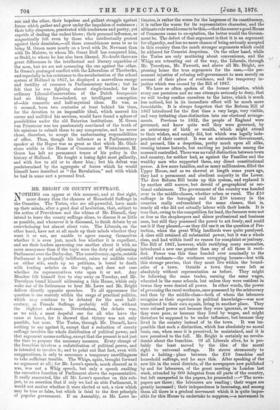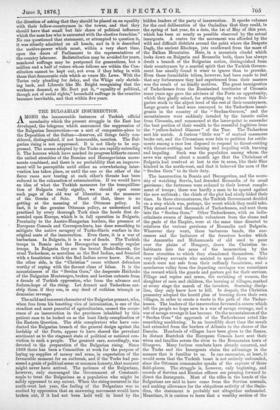3dR. BRIGHT ON COUNTY SUFFRAGE.
NOTHING can appear at this moment, and at first sight, more dreary than the chances of Household Suffrage in the Counties. The Tories, who are all-powerful, have made up their minds, after a good deal of hesitation, that, subject to the action of Providence and the whims of Mr. Disraeli, they intend to leave the county suffrage alone, to discuss it as little as possible, and whenever it is discussed, to finish debate by an overwhelming but almost silent vote. The Liberals, on the other hand, have not at all made up their minds whether they want it or not, are unable to agree among themselves whether it is even just, much less whether it is expedient, and see their leaders answering one another about it with no more annoyance than if the topic were the duty of adjourning Parliament over the Derby-day. The constituency, again, outside Parliament is profoundly indifferent, raises no audible voice on either side, sends up no petitions, is bored to death with leading articles on the topic, and does not care whether its representatives vote upon it or not. Any Member felt himself free to stay away on Tuesday, and Mr. Trevelyan found himself addressing a thin House, which only woke out of its listlessness to hear Mr. Lowe and Mr. Bright deliver directly opposite speeches. To all appearance the question is one scarcely within the range of practical politics, which in iy continue to be debated for the next half- century, as Female Suffrage probably will be, without the slightest advance. Nevertheless, the debate was, as we said, a most .hopeful one for all who have the cause at heart, for it showed that victory was not only possible, but near. The Tories, through Mr. Disraeli, have nothing to say against it, except that a reduction of county suffrage involves the whole distribution of political power, and that argument means nothing, except that the present is not just the time to prepare the necessary measure. Every change of the franchise involves a redistribution of political power, and is intended to involve it; and to point out that fact, even with exaggerations, is only to announce a temporary unwillingness to take sufficient trouble. The Whigs, again, brought forward no argument at all ; for Mr. Lowe's speech, much cheered as it was, was not a Whig speech, but only a speech exalting the executive function of Parliament above the representative. It really amounted, like all Mr. Lowe's speeches on this sub- ject, to an assertion that if only we had an able Parliament, it would not matter whether it were elected or not, a view which may be true or false, but which is fatal to the first principle of popular government. If an Assembly, as Mr. Lowe in- timates, is rather the worse for the largeness of its constituency, it is rather the worse for its representative character, and the ultimate rule would come to be this,—that the nearer a good House of Commons came to co-optation, the better would the Govern- ment be. The defect of that argument is that it is an argument for oligarchy, and has no more chance of being seriously accepted in this country than the much stronger arguments which could be adduced for Camarist despotism. On the other hand, while the Tories are only muttering about convenience, and the Whigs are retreating out of the way, the Liberals, through Mr. Trevelyan, Mr. Fawcett, and above all Mr. Bright, are pressing home the true arguments for the case,—the per- manent injustice of refusing self-government to men merely on account of their place of residence, and the temporary in- justice which was caused by the Bill of 1867.
We have so often spoken of the former injustice, which every one perceives and no one attempts seriously to deny, that we will to-day confine ourselves to the latter, which is much less noticed, but in its immediate effect will be much more formidable. It is always forgotten that the Reform Bill of 1867 introduced for the first time a very large, very visible, and very irritating class-distinction into our electoral arrange- ments. Previous to 1832, the people of England were governed, and knew quite well they were governed, by an aristocracy of birth or wealth, which might attend to their wishes, and usually did, but which was legally inde- pendent of their control. It was an aristocratic Government, and pressed, like a despotism, pretty much upon all alike, rousing intense hatreds, but exciting no jealousies among the masses it controlled. There was no valid distinction between town and country, for neither had, as against the Families and the wealthy men who supported them, any direct constitutional power. A few score families, and as many millionaires, filled the Upper House, and as we showed at length some years ago, they had a permanent and obedient majority in the Lower. The first Reform Bill broke up this system, and replaced it by another still narrow, but devoid of geographical or sec- tional unfairness. The government of the country was handed over to the middle-classes, whether urban or rural. The £10 suffrage in the boroughs and the £50 tenancy in the counties really enfranchised the same classes, that is, nearly all who did not actually labour with their hands. It is true that, owing to the competition for land, the farmers were not as free as the shopkeepers and Minor professional and business men, but still they possessed the power to act freely, and could use it if they pleased,—as they did use it on the question of Pro- tection, when the great Whig landlords were quite paralysed. A class still retained all substantial power, but it was a whole class, and had within itself no reason for complaint or jealousy. The Bill of 1867, however, while rectifying many anomalies, introduced a new one greater than any of all those it recti- fied. Power was this time handed over nominally to the settled workmen—the workmen occupying houses—but with this strange proviso, that they must live within the bound- aries of a town. Outside a town they were left as absolutely without representation as before. They might be following the same trades, earning the same wages, educated in the same schools, but unless they were resident in towns they were denied all power. In other words, the power of governing the rural workmen, once possessed by the aristocracy and then by the middle-class—both of whom the labourers recognise as their superiors in political knowledge—was now transferred to their own equals, living in another place. They were refused power not because they were ignorant, or because they were poor, or because they lived by wages, and might therefore be supposed to be under influence, but because they lived in the country instead of in the town. It was im- possible that such a distinction, which has absolutely no moral basis, can, when once it is perceived, be maintained, and it is now perceived to the full. Mr. Bright is certainly no revolu- tionist about the franchise. Of all Liberals alive, he is pro- bably the least moved by the idea of the moral right to universal suffrage. He strove strenuously to find a halting - place between the £10 franchise and household suffrage, and he says this. After speaking of the new life in the rural districts, of the newspapers now published by and for labourers, of the great meeting in London last week, attended by 600 delegates from all parts of the country, but left unreported in the papers, he proceeded :—" The news- papers are there ; the labourers are reading ; their wages are greatly increased ; their independence is increasing, and among them all there is a gradual movement which it is quite impos- sible for this House to undertake to suppress,—a movement in the direction of asking that they should be placed on an equality with their fellow-countrymen in the towns, and that they should have that small but fair share of political influence which the man has who is entrusted with the elective franchise." No one questioned that statement, or attempted to question it, it was silently admitted on all hands, and in it is described the motive-power which must, within a very short time, open the doors of Parliament to the representatives of the country labourer. Redistribution may be avoided for years, manhood suffrage may be postponed for generations, but a million and a half of voters whose fellows are within the Con- stitution cannot be kept out, not even if they bring in with them that democratic rule which so vexes Mr. Lowe. With the Tories only pleading for delay, and the Whigs only shrink- ing back, and Liberals like Mr. Bright recognising that the workmen demand, as Mr. Burt put it, "equality of political, though not of social rights," household suffrage in the counties becomes inevitable, and that within five years.































 Previous page
Previous page